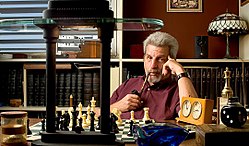Yakir Aharonov
Yakir Aharonov | |
|---|---|
 | |
| Born | 28 August 1932 |
| Residence | United States |
| Nationality | Israeli |
| Alma mater | Technion Bristol University |
| Known for | Aharonov–Bohm effect Weak values Two-state vector formalism |
| Awards | National Medal of Science (2009) Wolf Prize (1998) Elliott Cresson Medal (1991) |
| Scientific career | |
| Fields | Physicist |
| Institutions | Perimeter Institute Chapman University Tel Aviv University University of South Carolina George Mason University Brandeis University Yeshiva University |
| Doctoral advisor | David Bohm |
| Doctoral students | David Albert Avshalom Elitzur Lev Vaidman Sandu Popescu |
| Notes | |
He is the uncle of Dorit Aharonov. | |
Yakir Aharonov (Hebrew: יקיר אהרונוב; born on August 28, 1932)[1] is an Israeli physicist specializing in quantum physics. He is a Professor of Theoretical Physics and the James J. Farley Professor of Natural Philosophy at Chapman University in California. He is also a distinguished professor in the Perimeter Institute[2] and a professor emeritus at Tel Aviv University in Israel. He is president of the IYAR, The Israeli Institute for Advanced Research.[3]
Contents
Biography[edit]
Yakir Aharonov was born in Haifa. He received his undergraduate education at the Technion – Israel Institute of Technology in Haifa, graduating with a BSc in 1956. He continued his graduate studies at the Technion and then moved to Bristol University, UK together with his doctoral advisor David Bohm, receiving a PhD degree in 1960.
Academic career[edit]
His research interests are nonlocal and topological effects in quantum mechanics, quantum field theories and interpretations of quantum mechanics. In 1959, he and David Bohm proposed the Aharonov–Bohm effect for which he co-received the 1998 Wolf Prize.
In 1988 Aharonov et al. published their theory of weak values.[citation needed] This work was motivated by Aharonov's long time quest to experimentally verify his theory that apparently random events in quantum mechanics are caused by events in the future (two-state vector formalism). Verifying a present effect of a future cause requires a measurement, which would ordinarily destroy coherence and ruin the experiment. He and his colleagues claim that they were able to use weak measurements and verify the present effect of the future cause.[citation needed]
2008–Present: Professor of Theoretical Physics and the James J. Farley Professor of Natural Philosophy at Chapman University
2006–2008: Professor at George Mason University
1973–2006: Joint professorship at Tel Aviv University and the University of South Carolina
1967–1973: Joint professorship at Tel Aviv University and Yeshiva University
1964–1967: Associate Professor, Yeshiva University
1961–1964: Assistant Professor, Yeshiva University
1960–1961: Research Associate, Brandeis University
Awards and recognition[edit]
1978: Elected Fellow of the American Physical Society[4]
1984: Weizmann Prize in Physics
1984: Rothschild Prize in Physics
1989: Israel Prize in exact science[5]
1990: Elected to the Israel Academy of Sciences and Humanities
1991: The Elliott Cresson Medal – The Franklin Institute
1992: Honorary Doctor of Science, Technion – Israel Institute of Technology
1993: Elected Member of the National Academy of Sciences, USA
1993: Honorary Doctor of Science, University of South Carolina, USA
1995: Hewlett–Packard Europhysics Prize
1997: Honorary Doctor of Science, Bristol University, UK
1998: Wolf Prize in Physics[6]
1999: Honorary Doctor of Science, University of Buenos Aires, Argentina
2006: EMET Prize in Exact Science
In 2009, the information service Thomson Reuters named Aharonov as leading candidate for the 2009 Nobel prize in physics, based on his work's influence on quantum physics.[7]
2010: National Medal of Science (2009), awarded and presented by President Barack Obama. [8]
See also[edit]
References[edit]
- ^ "Yakir Aharonov's Homepage at Chapman University". Chapman University. Archived from the original on January 18, 2013. Retrieved February 17, 2013.
- ^ "Nine Leading Researchers Join Stephen Hawking as Distinguished Research Chairs at PI - Perimeter Institute". www.perimeterinstitute.ca. Archived from the original on 31 October 2012. Retrieved 7 May 2018.
- ^ "אייר - המכון הישראלי למחקר מתקדם - סגל המכון". www.iyar.org.il. Archived from the original on 1 March 2018. Retrieved 7 May 2018.
- ^ "APS Fellow Archive". www.aps.org. Archived from the original on 11 March 2018. Retrieved 7 May 2018.
- ^ "Israel Prize Official Site – Recipients in 1989 (in Hebrew)". Archived from the original on 2012-03-07.
- ^ Simply-Smart. "תוצאות חיפוש". www.wolffund.org.il. Archived from the original on 5 February 2012. Retrieved 7 May 2018.
- ^ Analytics, Clarivate. "ScienceWatch.com - Clarivate Analytics". science.thomsonreuters.com. Archived from the original on 10 August 2010. Retrieved 7 May 2018.
- ^ "Error Page 404 File Not Found - National-Academies.org - Where the Nation Turns for Independent, Expert Advice". www.nationalacademies.org. Archived from the original on 20 October 2010. Retrieved 7 May 2018.
External links[edit]
- 1932 births
- Living people
- Jews in Mandatory Palestine
- Israeli Jews
- Israeli physicists
- Israel Prize in exact science recipients
- Israel Prize in exact science recipients who were physicists
- Jewish scientists
- Tel Aviv University faculty
- Wolf Prize in Physics laureates
- Fellows of the American Physical Society
- Members of the European Academy of Sciences and Arts
- People from Haifa
- Chapman University faculty
- Members of the Israel Academy of Sciences and Humanities
- Members of the United States National Academy of Sciences
- Alumni of the University of Bristol
- Jewish physicists